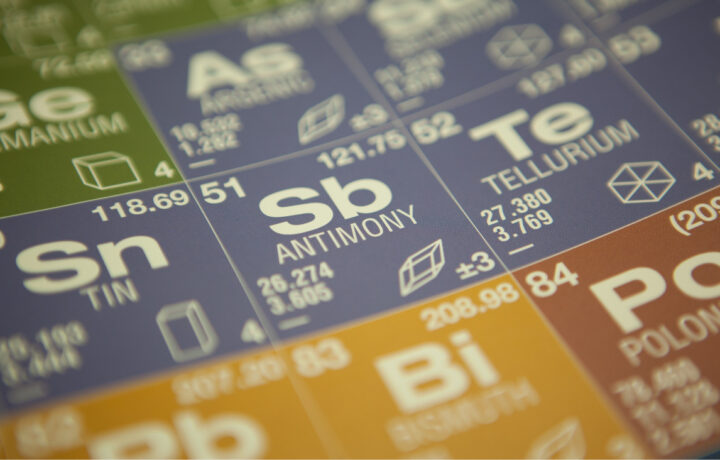Last week, China announced it would place stringent export restrictions on “dual-use” technologies for both civilian and military use – a move that was targeted directly at the United States. Washington already has similar export bans of such technologies, but it came just days after Beijing had also banned shipments of several minerals used in semiconductor and defense technology manufacturing.
These include gallium, germanium, and notably antimony, while even graphite could be placed under increased scrutiny.
Minerals Few Can Even Name
Gallium, germanium, and antimony are all vital materials in defense components, but it is the latter that is an especially critical chemical element.
A lustrous gray metal or metalloid, antimony is often mistaken for silver or lead. However, the mineral – which has been known since antiquity and has the atomic number 51 – was only chronicled in the West in the 16th century. However, it was likely used to make eyeliner in ancient Egypt and was thus considered quite a precious metal, even one of significant value.
While it resembles metal, it is too brittle to use on its own. Its most common application in the modern era has been in alloys with lead and tin, as it can improve the rigidity of lead-alloy plates in lead-acid batteries, while it is used as a dopant in semiconductor devices.
During the Second World War, antimony was a vital component in the production of ammunition, tungsten steel and to harden lead bullets. The Greatest Generation had significant quantities to it, as the United States supplied 90% of its own needs. However, no antimony is mined in the United States, and its hoard is limited.
U.S. Shell Production Requires Antimony
A shortage of antimony could impact the U.S. military’s efforts to replenish its stockpiles of ordnance, notably 155mm artillery shells, which have been depleted as Washington provided thousands of rounds to aid Kyiv in its war effort.
The U.S. Army had set a goal of producing 100,000 shells per month by next year – and the service was well on its way, but it is unclear what China’s export ban will mean for the replenishment efforts.
Sources Beyond China
China remains the world’s leading producer of antimony. According to the Center for Strategic and International Studies (CSIS), since export restrictions were imposed this past September, shipments of the mineral from China have dropped 97% while prices have increased 200%.
There has been speculation that prices could even increase to 300% by January.
However, while China and Russia have the largest reserves of antimony – about 350,000 tonnes each – Australia has around 120,000 tonnes, and Canada has another 78,000. The United States is reported to have at least 60,000 tonnes. Last week, Vancouver-based Military Metals Corp. announced it would focus exploration of antimony, as well as gallium and germanium – as the latter two are vital minerals used in advanced microchips.
A U.S. Geological Survey report released last month warned that a total export ban on gallium and germanium from China could result in a $3.4 billion loss in GDP for the U.S. economy.
“This announcement from China reinforces the importance of Military Metals’ mission to secure a sustainable, independent future supply chain for critical minerals,” Scott Eldridge, CEO of Military Metals Corp. said in a statement. “The West can no longer afford to rely on adversarial nations for resources essential to our security and economic stability. We are taking proactive steps to meet this growing demand with future domestic and allied sources of antimony.”
Military Metals recently acquired the West Gore Antimony Project, one of the largest historically producing antimony mines in Canada, while it has also purchased one of Europe’s largest antimony deposits in NATO member nation Slovakia.
Avoiding a Tungsten Shortage
The U.S. Department of Defense (DoD) may have been caught off guard by Beijing’s antimony export ban, but the Pentagon has ensured it won’t face a similar shortage of the strategically important tungsten. The DoD had already announced it would ban contractors from purchasing the Chinese-mined metal beginning January 1, 2027.
The U.S. has not commercially mined tungsten since 2015, but another Canadian firm, Almonty Industries, has announced it is on track to reopen the Sangdong mine in eastern South Korea. That facility was closed in 1994 due to cheaper Chinese tungsten flooding the market and undermining South Korea’s price competitiveness – but could soon be back online.
Tungsten is another strategic metal, used in semiconductors, electric vehicle batteries, automobiles, weapons, and industrial cutting machines due to its exceptional hardness and high energy density.

